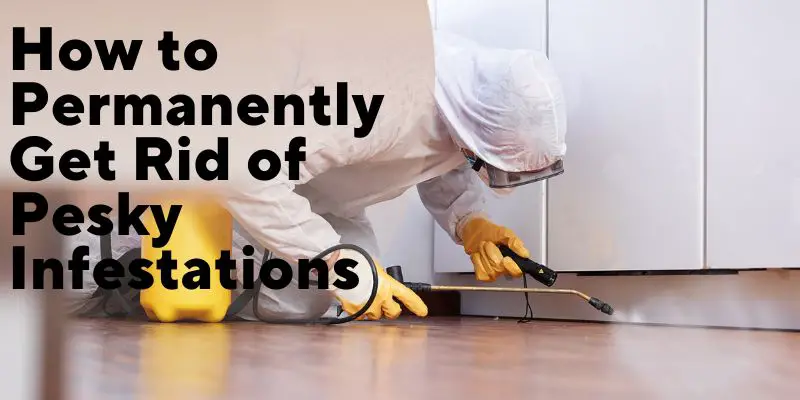A. Identifying the Type of Infestation
Let’s play CSI, except our crime scene swipes left on humanity and dates pests. We can’t nab the culprits without knowing them right? So, here’s our usual bug-circle:
- Termites: Say goodbye to your vintage wooden floor if you spot piles of sawdust around. Yep, it’s termites, eat-out buddies for your wood.
- Cockroaches: Seeing one hurriedly sneaking across your floor, especially at night, is like winning a dreadful lottery.
- Ants: Ever walked into your room to find a ‘conga line’ of ants parading around? Then congratulations! You’re not alone.
Ignoring these uninvited guests could manifest in health hazards and property damage. Imagine your house standing on a termite-hollowed foundation. Just thinking about it gives me the jitters!

B. The Nature of the Pest’s Habitat
Like us, pests are always on the hunt for the perfect home – ours. They love cozy, damp, secluded places, which are not hard to find, especially if your home’s layout is like a tempting Airbnb for them. The underside of floorboards, kitchen corners, or basements, are their real estate hotspots.
C. The Life Cycle of Common Pests
Pests are like grosgrain ribbon – entangled and ever-expanding. Understanding their life cycle can give us the edge in defeating them. For instance, a termite queen lives up to twenty-five years and can produce almost thirty thousand eggs a day. Now, that’s a petrifying maternity ward!
II. Prevention Over Cure: Keeping Pests at Bay
A. Maintaining Good Housekeeping Practices
Pests are dirt-loving, unavoidable, party poopers. So, hit them where it hurts by maintaining good hygiene. Regular cleanliness in vulnerable areas and using natural cleaning agents like white vinegar or baking soda can be highly effective.
B. Home Renovations and Repairs to Counter Infestations
Remember that small crack you’ve been ignoring? It’s an all-access VIP pass for pests. Repairing such structural damages, ensuring good ventilation, and opting for pest-repulsive materials could work like a homemade pest bouncer.
C. Outdoor Vigilance to Limit Indoor Infestations
Every party starts with an invite, and the same with pests. Maintain outdoor cleanliness, manage waste disposal, and pest-proof all potential entrances. In short, turn your home into Fort Knox for pests!
III. Eradicating Existing Pest Infestations
A. Employing Natural Pest Control Remedies
Get old-school and whip out a concoction of plant-based remedies like citronella or eucalyptus oil. However, remember that while this works fine for minor infestations, they are not exactly bug-busters for serious cases.
B. Resorting to Chemically-Based Pest Control Methods
Chemical pesticides show up like Thor’s hammer on pests. Yet, before you gloved up, remember that the downside could be potential health hazards. Always handle chemicals responsibly and instruct children about their dangers.
C. Hiring Professional Pest Control Services
If the infestation turns into a stubborn roommate, it’s time to call in the big guns – professional exterminators. They provide efficient solutions but ensure they are reputable by investigating their methods and certifications.
IV. Sustaining a Pest-Free Environment After Eradication
A. The Role of Regular Monitoring and Assessment
The pest war doesn’t end with eradication. Set up regular pest inspections and control measures. Because let me be honest, no one, and I mean no one, would like an encore from these pests!
B. Building a Better Future: Educating Household Members
Pass on the wisdom of pest control to your munchkins, make them your co-warriors. Remember, awareness is our greatest weapon.
C. Dealing with the Aftermath of Infestation
If your floor looks like its days were spent batting for pest cricket, maybe it’s time for a replacement. Take this as an opportunity to upgrade to pest-resistant flooring.
V. Common Misconceptions about Pest Infestation
A. Busting Pest-Related Myths
Here’s a myth-buster – “Bug bombs are the most effective.” Newsflash: they can scatter pests, making elimination tougher. Always research and understand the pest market gimmicks before using them.
B. Distinguishing Beneficial Insects from Pest Intruders
Not all bugs are thugs. Some insects like ladybugs, bees, and spiders are beneficial for our ecosystems. So, don’t outrun every bug you encounter, they might just be the good guys!
C. Addressing Open Questions in Pest Control
For grey areas in pest control, turn to reliable sources like pest control professionals, research journals, or community discussions. Remember, the only bad question is the one not asked.
Related Post: How to permanently eradicate bedbug Infestations
VI. Conclusion: Winning the Battle Against Persistent Pests
In this great war against our six-, eight-, or multiple-legged invaders, being aware, responsible, and vigilant is our best bet. Now let’s armor up with all this valuable information, because keeping our homes pest-free is a constant, but winnable battle, my friends!
Let’s armor up with this valuable information – because keeping our homes pest-free is a constant but winnable battle!
FAQs
Most asked queries and my best answers:
- What are the common signs of a pest infestation? Droppings, property damage, and sightings of pests are big red flags.
- How often should I clean my house to prevent pests? Regular maintenance checks and thorough cleaning every week should do the trick.
- Can natural remedies completely remove pest infestations? For minor infestations, it might. But for severe ones, better call Saul! winks (by Saul, I mean the professionals)
- Is it safe to use chemical pesticides at home? Only when used with caution and always out of reach from children and pets.
- How can I make sure the pest infestation doesn’t recur? Regular inspection, cleanliness, and immediate action on spotting any sign are your best defense.
- How often should I schedule a professional pest inspection? Annually, or when an infestation is suspected.
- Can pests damage my floor beyond repair? Especially if we are talking about termites. That’s why early detection and action are crucial.
- Are all insects pests? Not at all, some are parts of ecological harmony. It’s like differentiating Sheldon from the rest of the Big Bang Theory guys, you need to know!
- Where can I find reliable information about pest control? Pest Control Blogs, dedicated forums, and organizations like the National Pest Management Association (NPMA) are great for information soup.
